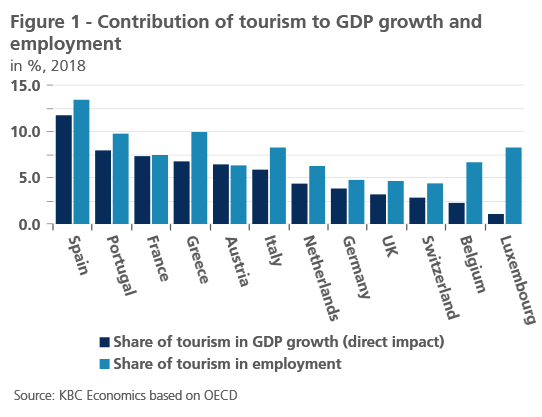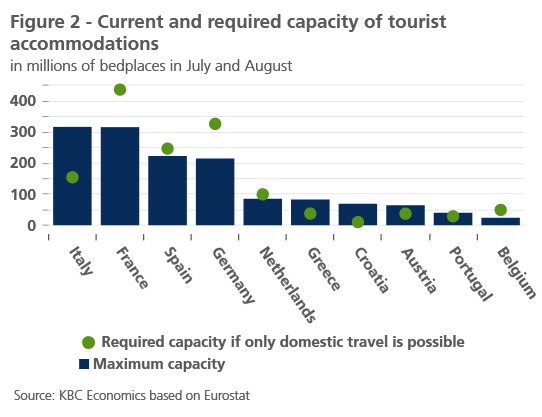Staycation instead of vacation due to corona crisis?


Will we be allowed to make tourist trips this summer? It's a question that's popping up more and more in Europe now that the number of new confirmed coronavirus cases is declining. Summer vacations abroad, typically booked months in advance, are at risk of being cancelled, and even domestic vacations are still hanging in the balance. Even if the latter is allowed, replacing foreign trips by domestic vacations, so-called staycations, is not without its limits. Many European countries simply do not have sufficient capacity and others will struggle to fill their tourist accommodations.
The coronavirus is spreading quickly all over the world. This has led to an unprecedented array of measures in various countries to contain the spread of the virus, including closing borders and banning non-essential movements. All economic sectors are affected but almost none as much as tourism. Hotel rooms are empty, planes remain grounded and the beaten tracks around tourist hotspots are empty aide from locals attending to their essential business.
The standstill in the tourist sector is having a negative impact on economic growth in many euro area countries, but the size of the impact varies greatly between countries. Figure 1 shows the contribution of the tourism sector to real GDP growth and its share in employment. The figure clearly shows that Southern Europe is more dependent on tourism than Northern Europe. Spain tops the table with a real GDP contribution of just under 12%. The other southern European countries, France and Austria follow with figures between 6% and 8%. These figures are only the tip of the iceberg though, as the indirect impact of the tourism sector on other economic sectors is not taken into account. For example, the construction of hotels is not included.

If we look at the share of employment in the tourism sector in relation to total employment, we again see that Southern Europe is the most vulnerable to a decline in tourism. Here too, Spain stands out far above the rest with a share of tourism in employment of more than 13%. Greece and Portugal follow with figures around 10%.
The two countries that were hit hardest by the coronavirus in Europe, Italy and Spain, both heavily depend on tourism for their economic growth. This complicates the decision-making process for experts and politicians about whether to open the borders for the summer season.
Staycation as an alternative?
Since there is still a lot of uncertainty about when the borders will open again, we see an increase in references to staycations, holidays in your own country, as an alternative to travelling abroad. There are, however, limitations to this formula. On the one hand, it is still uncertain in many countries whether the inhabitants will even be allowed to travel in their own country during the summer months. On the other hand, it is unlikely that the tourism sector will have the capacity to meet a strong shift in demand in all countries.
The blue bars in figure 2 show the 2018 maximum capacity in terms of overnight stays at hotels, campsites and other accommodation in several EU countries during the summer months. The green dots show the necessary capacity for overnight stays per country if all inhabitants would book the same number of overnight stays as they did in 2018, but in their own country. If the green dot is above the blue bar, there is a capacity shortage. This is the case in France, Spain, Germany, the Netherlands and Belgium. In countries such as Italy, Greece, Croatia, Austria and Portugal there will be a lot of unused capacity if foreign tourists stay away because of closed borders.

If we calculate the factor by which we have to multiply the current maximum capacity so that all foreign holidays can be replaced by domestic holidays, we see that especially Belgium, Germany and France have a substantial under-capacity (see table 1). In Belgium, the current capacity would even have to double if all Belgians spend their holidays domestically. In Germany and the Netherlands, the capacity would have to increase by 1.52 and 1.38 respectively. In practice, however, this figure would be even higher because the theoretical figure assumes a perfect spread of the holidays of all inhabitants over the two summer months and over all available accommodations.
At the other end of the spectrum, we see that Greece and Italy will not even be able to fill half of their capacity. This is very bad news as these countries are already in a dire economic state and depend heavily on tourism for their GDP growth.
Evidently, it is unlikely that all people would convert their holiday abroad to a domestic holiday if the borders remain closed, especially in those countries where the lockdown has taken a hard hit on employment and incomes. Even so, our analysis indicates that staycations will run into capacity constraints in many countries, especially with social distancing rules in mind.
Ultimately, it will be up to the medical experts and politicians in the various countries to decide whether the borders can be reopened for tourists this summer and whether we will be allowed to travel in our own country. Spain announced earlier that it is considering banning all foreign tourists this summer while Austria cautiously indicated that it might open the borders for tourists from countries that have the virus under control. In the meantime, the European Commission is calling for a joint and very steady approach for the phasing out of the corona-measures. Whatever happens, summer holidays will likely look a little different this year, just like all other aspects of life the past few weeks.
